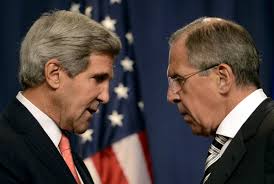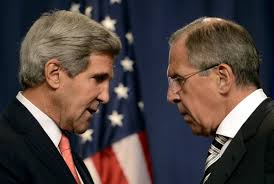US-Russian Conflict Keeps Destroying Syria

Sami Kleib - al-Akhbar newspaper
 The US diplomacy hasn't witnessed such a vivid activity in the Arab nation as it is today. Barack Obama has been to Saudi Arabia, and then later received at the White House Tunisian Prime Minister, Mehdi Jomaa. John Kerry, for his part, visited the "Israeli" [entity] and Amman, before tasking Martin Indyk, "Israel's" long-time ally, with mediation between Tel Aviv and Ramallah. He then left to Morocco; Algeria next. In all tours, key talks took place between Egypt's Foreign minister, Nabil Fahmi, and NATO'S Anders Fogh Rasmussen. There were also positive statements by the US ambassador in Cairo, Thomas Shannon, on the "strong" and "solid" relations between Egypt and USA.
The US diplomacy hasn't witnessed such a vivid activity in the Arab nation as it is today. Barack Obama has been to Saudi Arabia, and then later received at the White House Tunisian Prime Minister, Mehdi Jomaa. John Kerry, for his part, visited the "Israeli" [entity] and Amman, before tasking Martin Indyk, "Israel's" long-time ally, with mediation between Tel Aviv and Ramallah. He then left to Morocco; Algeria next. In all tours, key talks took place between Egypt's Foreign minister, Nabil Fahmi, and NATO'S Anders Fogh Rasmussen. There were also positive statements by the US ambassador in Cairo, Thomas Shannon, on the "strong" and "solid" relations between Egypt and USA.
In the meantime, Chairman of the US Joint Chiefs of Staff, Martin Dempsey, and "Israeli" war minister, Moshe Yaalon, have intensified meetings in the occupied land. Just a week ago, it was Yaalon himself who said that the US had become weak and that its provisional deals with Iran were nothing but a legacy of confrontation for the next American president.
What to suspect in all this?
On a larger scale, the US action towards the fragmented Arab nation, whose sons are inter-fighting, whose Palestine is lost within inter-killing, is analogous to that towards Asia, with string-worded statements against Russia. For instance, US Defense Secretary, Chuck Hagel, has just lobbed threats from Japan, where he's on a support visit against North Korea, saying: "Russia's annexation of Crimea has raised concerns amid America's allies in the Pacific Ocean region and other regions as well." He also menaces of sending two additional destroyers to Japan geared up with Aegis ballistic system, in a clear message to Moscow and Beijing, albeit the delivery won't take place before 2017.
In line with key developments from both sides to change the equation before the elections, China retorted in a white booklet. The 40-page answer criticized Washington without naming it. It read: "Some states are bolstering their military alliances in Asia and the Pacific Ocean, and expanding their military presence in the region; they're making the situation there even more disturbed." This report was issued just days before Hagel arrived in Beijing.
Shortly earlier, Washington had for the first time hosted the US and ASEAN (Association of Southeast Asian Nations) common forum on defense. Both the timing and the statements are important. During the event, which includes defense ministers from ten different countries from ASEAN, Hagel said that the US would not give up on any region in the world, including the Middle East. The world is then in front of a US multi-goal attack. At least four goals can be identified: tightening the grip on Russia and China after penetrating Ukraine, veering strategic compasses towards Asia, enhancing a wide front to sap terrorism, and protecting "Israel."
Where is Iran amid all that?
In keeping with this US attack, rivalry climbs between Iran and Saudi Arabia, with Iraq, Yemen, Syria, Lebanon, Afghanistan, Pakistan and others having become diplomatic and security engagement pockets. As soon as Islam Abad bids farewell its Saudi guest, Prince Salman, after inking many agreements, Pakistan and Iran will announce joint maritime trainings in Hormuz Strait.
The trainings will kick off with the meeting of Iranian Foreign Minister Mohammad Javad Zarif and European Union's Catherine Ashton. It is true that the meeting is taking place in a tense climate after Europeans decided to sit with Iranian oppositionists during their visit in Tehran; but it is also true that the tour of the nuclear experts which ended days ago was positive enough to pave the way for a nearing final deal on nuclear dossier.
This is the foremost Iranian speculation. This is as well the foremost Saudi concern. The agreements between Iran and the West at this time are important. Tehran can play an essential role in fighting terrorism. America and Iran's interests can intertwine at this stage in salient regions in the world, like Iraq and Afghanistan, where elections wouldn't be held if it weren't for the implicit US-Afghani cooperation. The positivity reigning over entente between the West and Iran in terms of the nuclear talks has dropped many walls. The US Treasury Department has allowed Boeing to export tools to the Iranian fleet. General Electric, for its part, will rehabilitate 28 engines that were sold to Iran in the late 1970's. Further economic steps are yet to come, especially after Washington made sure that Europe was seeking to beat around the bushes concerning contracts with the Islamic Republic.
"Israel" and Syria
The West openness to Iran is important at a time of conflict between the West and Russia. In the mind of Washington, Tehran can turn into a partner, not instead of KSA or the Gulf states. But there are two problems: "Israel" and Syria.
On the "Israeli" dossier, there is a clear American encouragement to enhance security ties between "Israel" and a number of Gulf states. "Israeli" talk about interests' meeting against Iran is not just rumors.
There are talks of trainings and meetings. This is all important as the US is seeking to pass a deal between the "Israelis" and the Palestinians that seem to be a failure up till now. Security for Saudi Arabia in counterpart of recognizing the Jewish character of the Hebrew state. Washington cannot talk Tehran into accepting such a deal. Iran is decisive and conclusive when it comes to considering "Israel" an enemy and a cancer.
The Arab Foreign Ministers will meet on Wednesday to discuss the Palestinian dossier. It is such an embarrassment! Neither can they nod in approval, nor can they piss America off. Tehran is more at ease, because the option of peace through negotiations is failing day after day.
On the Syrian file, the issue is complicated. Iran barely accepts a national unity government comprising the Syrian authority and some of the opposition, with a few extra powers. This entails to cease gearing up and funding gunmen. This also entails not to tamper with the status of President Bashar Assad in the upcoming stage.
Washington and some western and Arab states have no retreat but military pressure. Meetings are being held one after another to come out with a Cabinet and military lineup from the opposition side. This configuration is sought to give reassuring sigs on the future of weapons if ever upgraded. Reaching this phase is very dangerous. The military command is well aware that Moscow and its allies may let in even more lethal arms into Syria.
Besides the meetings and trainings, there are talks about a new mechanism to keep tabs on weapons, by the US of NATO officers. It is eve being said that a central room has been set and linked to operation rooms in some provinces and fronts. The goal is not to overthrow the regime by force. This is doomed to failure just like before. The goal is to restore military balance on the ground, after gunmen have lost a lot of strategic regions.
Moscow is just lying in wait! It wasn't true that its preoccupation in Ukraine would make it give up on Assad. Syria's battle is the same as Moscow's. Vladimir Putin's administration has intensified pressures on the Syrian opposition to relinquish terrorism. It backed the Syrian authority in accusing some oppositionists of attempting to use chemicals in Ghouta. Moscow said it would be sending more weapons to Syria; it seems they are already there. Some info were leaked about the Syrian army having obtained Smerch rocket launchers a month ago.
Apparently, the war in Syria is about to see major developments. More blood is asked before the presidential polls. The rivals of Assad, Iran, and Hizbullah are trying to change the equation before Assad is president again. Bashar and his allies, for their part, are trying to speed up the rhythm of the battle to regain control over all strategic cities, towns, regions, and fronts before mid-summer.
The expectations of General Dempsey are seemingly correct. He said that solving the Syrian plight might take ten years. Two years earlier, Assad has said that the war would be long, but confirmed his axis would triumph.
The key question remains: will the US-Russian conflict grow sharper, only to exacerbate destruction and bloodshed in Syria? Or will both parties head to Geneva for the third time? Both possibilities can happen. Negotiations will not stop the war. Goals are not yet achieved. The only thing that can change the entire equation is the expansion of terrorism; when the US administration will have to publically announce what it has been accepting behind closed doors or implicitly, that is to say the stay of Assad in power as the sole means to combat terrorism.
Translated by al-Ahed news
Comments




